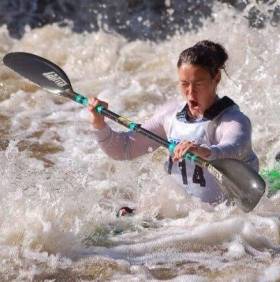Displaying items by tag: Tom Brennan
Egan Seventh in Second Olympic Qualifier Final
#Canoeing: Jenny Egan finished seventh in her K1 200m final at the canoe sprint European Olympic Qualifier in Duisburg in Germany today. Germany and Sweden secured the top two spots, and with them places at the Olympic Games in Rio de Janeiro. Egan was in the middle of the group from third to ninth who were covered by less than a second. The Irishwoman was competing in her second final of the day.
Tom Brennan finished ninth in his final of the K1 200, with the top two of Spain and Hungary qualifying for Rio de Janeiro.
Canoe Sprint European Olympic Qualifier, Duisburg, Germany (Selected Results, Irish interest)
Men
K1 1,000 – Final: 1 Hungary (B Dombvári) 3 min 35.307, 2 Russia (R Anoshkin) 3:35.695; 4 M Fitzsimon 3:38.727.
K1 200 – Final: 1 Spain (S Craviotto) 34.615, 2 Hungary (Be Horváth) 35.077; 9 T Brennan 36.773.
Women
K1 500 – Final: 1 Germany (S Hering) 1 min 55.378, 2 Slovakia (M Kohlová) 1:55.677; 8 J Egan 2:00.270.
K1 200 – Final: 1 Germany (S Volz) 41.470, 2 Sweden (L Stensils) 41.509; 7 J Egan 42.874.
Paracanoe World Championships, Duisburg
Men - KL3 200 – B Final (Places 10-18): 1 P O’Leary 42.882 seconds.
Ireland Reach Four Finals at Olympic Qualifier
#Canoeing: Ireland brought their tally of finals reached to four at the canoe sprint European Olympic Qualifier in Duisburg today. Jenny Egan made her way to a second final – the K1 200 – and Tom Brennan for the men’s equivalent in the afternoon session. They will qualify for Rio if they finish in the top two in their finals.
Canoe Sprint European Olympic Qualifier, Duisburg, Germany (Selected Results, Irish interest)
Men
K1 1,000 – Heat One (Winner to A Final; 2-7 to semi-final; rest out): 4 M Fitzsimon 3:31.693. Semi-Final: 1 Fitzsimon 3:31.453.
K1 200 – Heat Two (Winner to Final; 2-7 to semi-final; rest out): 4 T Brennan 35.85. Semi-Final (Three to Final; rest out): 3 Brennan 35.938.
K2 200 – Heat One (First Three to A Final; 4-7 to semi-final): 6 T Brennan, B Watkins 34.350. Semi-Final (First Three to A Final; rest out): 5 Brennan, Watkins 34.249.
Women
K1 500 – Heat One (Three to Final; 4-7 to Semi-Final): 5 J Egan 1:55.428. Semi-Final (Three to A Final): 3 Egan 1:52.823.
K1 200 – Heat One (Three to Final; 4-7 to Semi-Final): 3 J Egan 41.515.
Paracanoe World Championships, Duisburg
Men - KL3 200- Heat Four (First Seven to Semi-Final): 2 P O’Leary 42.061. Semi-Final One (First Two and next best time to A Final; 3rd, 4th to B Final): 3 O’Leary 41.722.
Fleming's K2 Fastest in Liffey Descent
#CanoeingLiffeyDescent: Neil Fleming and Robin Koenders were the fastest crew home at the 56th Liffey Descent today. In a race run in warm sunshine and light winds from Straffan to Islandbridge, the K2 of Fleming and Dutchman Koenders gained a considerable lead by Lucan over nearest challengers Gary Mawer and Barry Watkins. The winning time of one hour 48 minutes 32 seconds was outside the record for the course.
The fastest K1 paddler was Tom Brennan, winning this class for the first time, and coming home well under two hours.
Jenny Egan and her boyfriend Jon Simmons won the mixed K2. They set a new record time of one hour 53 minutes and 26 seconds.
Liffey Descent 2015 (Selected Results)
K2: 1 R Koenders, N Fleming 1 hour 48 minutes 32 seconds, 2 B Watkins, G Mawer 1:51.00, 3 L Van Riet, E Van Riet (Sth Africa) 1:51.42. Junior: C Crate, J O’Hagan 2:05.04. Master: D Halton, J Morrissey 2:02.51.
K1: 1 T Brennan 1:56.22, 2 J Boyton 1:59.38, 3 M Brennan 1:59.44. Junior: E Forristal 2:05.35.
K2 Mixed: J Simmons, J Egan 1:53.26.
Wildwater - Junior: C Clarke 2:19.16
General Purpose – Junior: 2:35.34. Masters: J Mescal 2:31.30. Veteran: E Moran 2:43.36.
























































